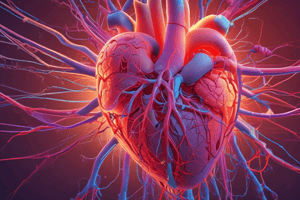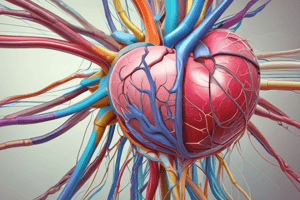Podcast
Questions and Answers
What role does the sympathetic nervous system play in heart rate during exercise?
What role does the sympathetic nervous system play in heart rate during exercise?
- It decreases heart rate.
- It increases heart rate. (correct)
- It causes irregular heart rhythms.
- It stabilizes heart rate.
Which part of the heart is primarily affected by impulses from the sympathetic nervous system?
Which part of the heart is primarily affected by impulses from the sympathetic nervous system?
- Purkinje fibers.
- Sinoatrial node. (correct)
- Atrioventricular node.
- Bundle of His.
What effect does the increase in impulses to the ventricles have during exercise?
What effect does the increase in impulses to the ventricles have during exercise?
- No effect on contraction strength.
- More frequent and forceful contractions. (correct)
- Decreased force of contraction.
- Irregular contraction patterns.
Why is blood and oxygen delivery increased during exercise?
Why is blood and oxygen delivery increased during exercise?
What ability does the sympathetic nervous system give a person during repeated high-intensity sprints?
What ability does the sympathetic nervous system give a person during repeated high-intensity sprints?
Flashcards
Sympathetic Nervous System
Sympathetic Nervous System
The sympathetic nervous system is a part of the autonomic nervous system that prepares the body for 'fight or flight' responses, like during exercise.
Sympathetic Nerve
Sympathetic Nerve
The sympathetic nerve, also known as the accelerator nerve, sends messages from the medulla oblongata to the heart, increasing its rate.
Sinoatrial Node (SA Node)
Sinoatrial Node (SA Node)
The sinoatrial node (SA node) is the heart's natural pacemaker. When the sympathetic nerve sends signals, it increases the SA node's firing rate, causing the heart to beat faster.
Heart Contractions
Heart Contractions
Signup and view all the flashcards
Exercise and Oxygen
Exercise and Oxygen
Signup and view all the flashcards
Study Notes
Sympathetic Nervous System and Heart Rate
- The sympathetic nervous system increases heart rate.
- Messages travel from the medulla oblongata via the sympathetic/accelerator nerve.
- This increases the firing rate of the sinoatrial node (SA node).
- Increased firing rate causes stronger contractions in the atria.
- The impulses are passed on, causing stronger contractions in the ventricles.
- This delivery of more blood/oxygen to working muscles is crucial during exercise.
Impact on Exercise Performance
- This increased heart rate allows for higher exercise intensity, e.g., repeated sprints.
- It aids in delaying fatigue during high-intensity activities.
Studying That Suits You
Use AI to generate personalized quizzes and flashcards to suit your learning preferences.




